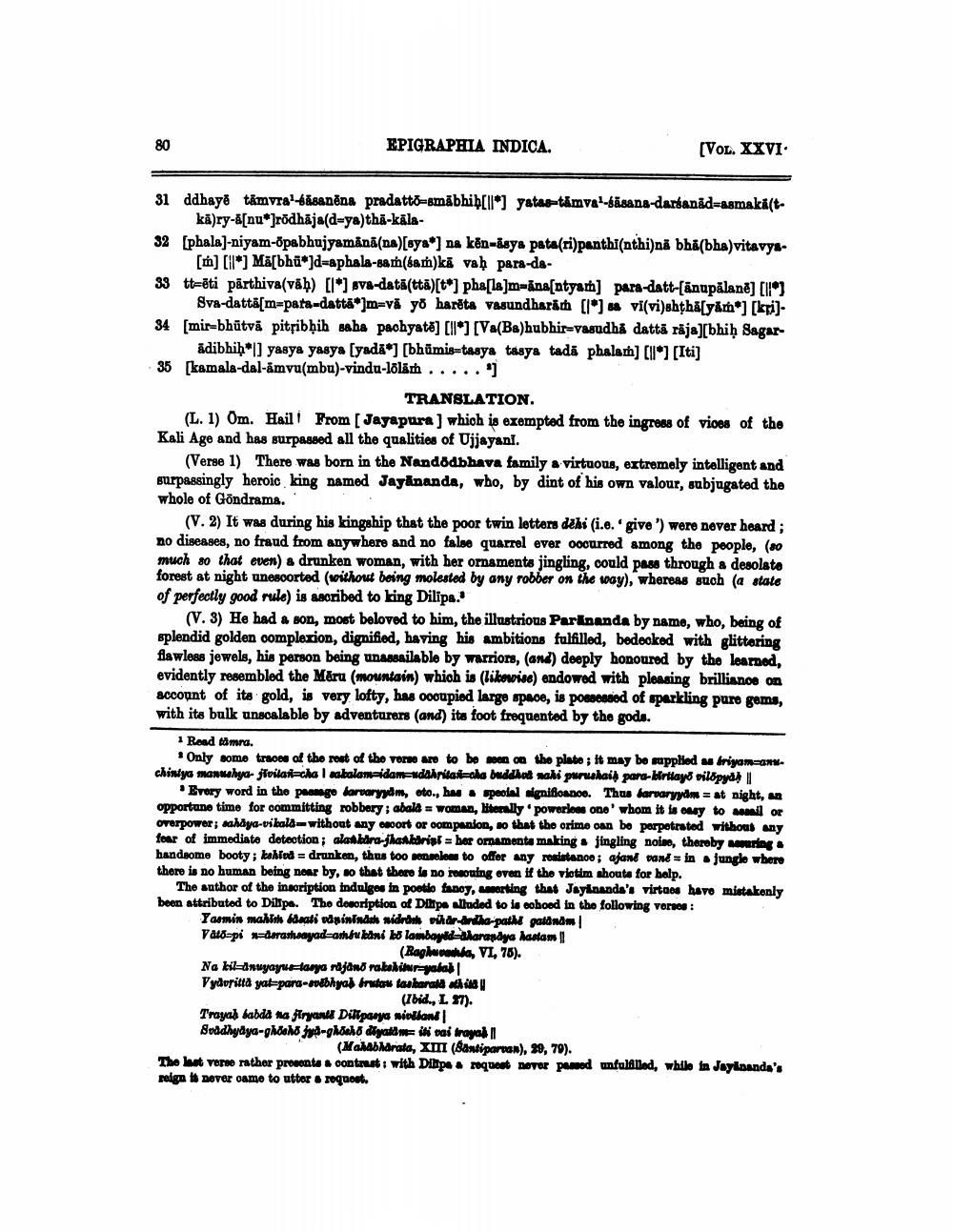________________
80
EPIGRAPHIA INDICA.
[VOL. XXVI.
31 ddhaye tamvra1-éasanena pradatto-smābhib[*] yatas-tamva1-säsana-darśanad-asmaka(tkā)ry-a[nu*]rōdhaja(d=ya)tha-kala
32 [phala)-niyam-Opabhujyamin&(na)[sya*] na kin-kaya pata(ri)panthi(nthi)nä bhā(bha)vitavya[][] MA[bh]d-aphala-each(fat)ka vab para-da
35 t-ti parthiva(väb) [1] sva-data(tt)[t] phala]m-äna[ntyamh] para-dat-[Anupalanē] [*] Sva-datta[m-para-datta"]m-vä yö hareta vasundharam [*] sa vi(vi)shṭhā[yam*] [kri]34 [mir-bhütva pitribbih saha pachyata] [*] [Va(Ba)hubhir-vasudha dettä raja][bhiḥ Sagaradibhiḥ*] yasya yasya [yada*] [bhumis-tasya tasya tada phalam] [*] [Iti] 35 [kamala-dal-amvu(mbu)-vindu-löläm . . . . . ]
TRANSLATION.
(L. 1) Om. Hail From [Jayapura] which is exempted from the ingress of vices of the Kali Age and has surpassed all the qualities of Ujjayani.
(Verse 1) There was born in the Nandödbhava family a virtuous, extremely intelligent and surpassingly heroic king named Jayananda, who, by dint of his own valour, subjugated the whole of Gōndrama.
(V. 2) It was during his kingship that the poor twin letters dehi (i.e. 'give') were never heard; no diseases, no fraud from anywhere and no false quarrel ever occurred among the people, (so much so that even) a drunken woman, with her ornaments jingling, could pass through a desolate forest at night unescorted (without being molested by any robber on the way), whereas such (a state of perfectly good rule) is ascribed to king Dilipa.
(V. 3) He had a son, most beloved to him, the illustrious Parananda by name, who, being of splendid golden complexion, dignified, having his ambitions fulfilled, bedecked with glittering flawless jewels, his person being unassailable by warriors, (and) deeply honoured by the learned, evidently resembled the Maru (mountain) which is (likewise) endowed with pleasing brilliance on account of its gold, is very lofty, has occupied large space, is possessed of sparkling pure gems, with its bulk unscalable by adventurers (and) its foot frequented by the gods.
1 Read tämra.
Only some traces of the rest of the verse are to be seen on the plate; it may be supplied as friyam-anuchintya manushya-jivilan-cha | sakalamidam-udahritan-cha buddhot nahi purushaiḥ para-kirtlays vilõpуāḥ ||
Every word in the passage farvaryyam, etc., has a special significance. Thus farvaryydm at night, an opportune time for committing robbery; abald woman, literally 'powerless one' whom it is easy to assail or overpower; sahaya-vikala without any escort or companion, so that the crime can be perpetrated without any fear of immediate detection; alabara-jhankarist her ornaments making a jingling noise, thereby assuring a handsome booty; kahied drunken, thus too senseless to offer any resistance; ajané vane in a jungle where there is no human being near by, so that there is no resouing even if the victim shouts for help.
The author of the inscription indulges in poetio fancy, asserting that Jayananda's virtues have mistakenly been attributed to Dilipa. The description of Dilipa alluded to is echoed in the following verses:
Yasmin mahimh éasati väninindak nidra vihar-ardha-pathi gatanām Valo-pin-derashsayad-ambukani kö lambayed-aharandya hastam ||
(Raghuvashia, VI, 75). Na kil-anuyayus tasya räjänő rakshitur yalab Vyavrittä yat-para-svēbhyaš brutau taskarašā stilā || (Ibid., L. 27). Trayah babda na jiryani Dilipasya nivilant Svadhyaya-ghoshöjd-ghōchō diyatām iti vai traya || (Mahabharata, XIII (Santiparvan), 20, 79).
The last verse rather presents a contrast: with Dilipa a request never passed unfulfilled, while in Jayananda's reign it never came to utter a request.




